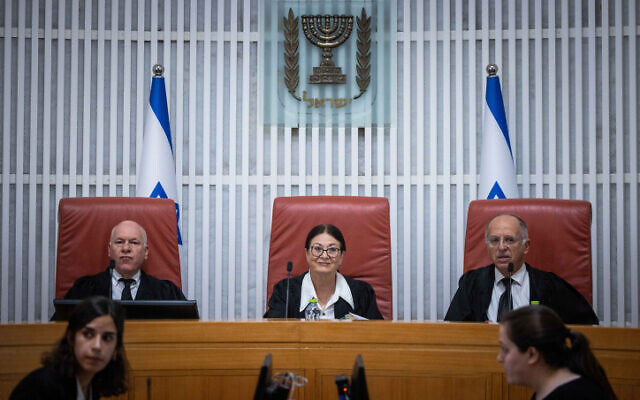Reasonable guardians? How repealing ‘reasonableness’ may affect top custodians of law
Opponents of the bill to ban the High Court’s use of the reasonableness standard argue it will open the door to politicisation of posts entrusted with safeguarding democracy.

The government’s radical judicial overhaul program has for the second time in six months led the country to the brink of chaos, with hundreds of thousands of demonstrators in the streets, society tearing itself apart and thousands of military reservists announcing a suspension of their service to a nation they fear will no longer be a democracy.
The proximate cause is the coalition’s bill — under debate in the Knesset and set to pass into law Monday or Tuesday — to bar the judiciary from striking down decisions by the government and cabinet ministers on the basis of being unreasonable.
The doctrine is used when the High Court believes that not all relevant considerations on a particular issue were taken into account when a decision was made, that those considerations were not given the appropriate weight, or that inappropriate considerations were involved.
This judicial tool, known as the “reasonableness standard,” has been used by the High Court to reverse some important, and some less weighty, government decisions over the years.
Cases in which it was employed have included the construction of a soccer stadium in Jerusalem, the provision of child-care subsidies to ultra-Orthodox families, the awarding of the Israel Prize, and rocket-proofing schools in the Gaza border region.
But the current outpouring of concern for Israel’s democratic character by hundreds of thousands of citizens as well as legal scholars and jurists (including some decidedly conservative figures) has focused on a potential problem that runs deeper than just policy decisions.
Easier to dismiss the attorney general, other gatekeepers
One of the central worries expressed by legal scholars with the way the bill, an amendment to Basic Law: The Judiciary, has been formulated is that it will make it much easier for the government to dismiss senior civil servants who are heads of critical law enforcement agencies, and thus subvert the rule of law.
The positions for which the highest level of concern has been raised are the attorney general, the state attorney and the police commissioner.
Among their other central tasks, the attorney general heads the public prosecution system and has the final say regarding indicting politicians accused of crimes; the state attorney as head of the State Attorney’s Office runs the process of drawing up and recommending indictments for all citizens; and the police commissioner oversees criminal investigations, police policy regarding arrests, managing the boundaries of freedom of expression and protest, and more.

Critically, the appointments of the attorney general and the state attorney are not governed by law, but rather by cabinet resolutions, which means that the dismissal of these key officials is dependent on the terms of the same resolutions.
Cabinet Resolution 1773, passed in the year 2000 regarding the attorney general, requires a special committee to identify the appropriate candidate, and says that the same committee must be consulted if the government wishes to dismiss the incumbent.
Crucially, however, the justice minister is not obligated to accept to the recommendation of the committee and could fire the job holder even in defiance of the committee’s decision.
And since the regulations are set out in a mere cabinet resolution, those regulations can themselves be changed by a vote of the cabinet, which could therefore simply change the rules to make the process even simpler.
The state attorney is also appointed by committee, but Cabinet Resolution 1585 passed in 2004 that established that committee did not establish the terms of dismissal, so how a state attorney can be fired is not fully clear.
Dismissing a police commissioner is easier and more straightforward. Since it is the cabinet that is directly responsible for selecting a police commissioner (upon the recommendation of the minister in charge of the police — today National Security Minister Itamar Ben Gvir — it is the cabinet that is also able to dismiss the police commissioner. It is possible that the independent Senior Appointments Advisory Committee would need to have a say, since the same committee examines the government’s choice prior to the appointment, but it is unclear whether the committee would have a formal role in dismissing them.
What connects the processes of dismissal for all three positions is the reasonableness standard: Because the High Court has been willing to use the judicial reasonableness test, governments have hitherto been forced to act with extreme care when considering such actions, knowing they would likely lead to immediate court scrutiny.
At present, should the government use arbitrary, political, extraneous, or other improper considerations to dismiss the heads of Israeli law enforcement, the High Court, if petitioned, could review the decision using the reasonableness standard and reverse it if it believed the decision to be harmful to the public interest.
Opponents of the coalition’s bill to ban the use of the reasonableness test argue that this is the strongest tool the court possesses to ensure the government’s power over these key figures is not abused.
Without the reasonableness standard, the dismissal of these key law enforcement officials could be done for improper and even corrupt reasons — to advance narrow political and personal goals — while making it far harder for the court to intervene, critics have argued.
“If they appoint convicted criminals to senior positions, no one will be able to stop them,” Opposition Leader Yair Lapid argued earlier this month. “They will be able to fire all the custodians of the rule of law, from the attorney general on down, and replace them with obedient and subservient puppets who will not prevent them from corrupting the country.”
The regulations entitling the government to fire the attorney general set out four possible reasons, including if the government and the attorney general have ongoing, substantive disagreements which prevent them from cooperating.

This cause would seem to give the current government scope to fire Attorney General Gali Baharav-Miara, even without the ban on the use of the reasonableness standard, since she has clashed with the government over numerous issues, including the legality of proposed legislation to Ben Gvir’s ability to directly set police policy against anti-government protesters.
But Prof. Barak Medina from Hebrew University’s Faculty of Law argues that this “disagreement” clause is qualified by the necessity of those disagreements to be within the bounds of what is reasonable, and the possible interpretations of existing law.
“If the government disagrees with the attorney general because the government prefers to ignore existing law and prefers not to obey legal standards, then those are disagreements with a body that wants to violate existing law,” argued Medina.
Firing the attorney general on such a basis could still today be deemed unreasonable, but once the coalition passes its bill banning the use of the standard against government decisions the High Court would be hard-pressed to reverse such a decision.
The only real tool?
One claim ostensibly mitigating the alarm of those opposing the coalition’s bill is that although the High Court would no longer be able to use the reasonableness doctrine to protect the positions of these key officials, there are other judicial tools at the court’s disposal.
But constitutional scholar Dr. Guy Lurie of the Israel Democracy Institute points out that reasonableness has been the only real tool the court has used to review government appointments or dismissals, because the court does not engage in “evidentiary work” where evidence and testimony is brought before it.
Deploying other standards, such as bias or conflict of interests, is therefore harder to justify since these would be difficult to prove in court to the justices, and since finding evidence of such malfeasance in the decision-making process itself would be extremely difficult.
Equally, deploying as yet unused theoretical standards such as inappropriate considerations, bad faith, or arbitrariness would require an activist court willing to defy the legislature through use of a new doctrine.
“Unless the state officials are very negligent, they won’t show that they have used inappropriate considerations or had a conflict of interests. They are usually not that flagrant,” said Lurie.
Ze’ev Lev, an attorney for the conservative Movement for Governability and Democracy organisation, very much dismisses the panic around the possible fate of the state’s law enforcement officials if the coalition’s bill is passed.

“Reasonableness is used against legal decisions; it is designed to stop only legal government actions,” he insists, because it is a “wildcard” used as a last resort when no legal impediment can be found to a decision or appointment.
And, he argues, since the attorney general is a key figure in any governing coalition who advises the government on the legality of its actions and legislation, and represents the government in legal proceedings against it, it is critical that the two can cooperate effectively, and for the government to have control over who occupies the post.
“The attorney general is a government appointee so all the protections in administrative law don’t apply to her. You can’t say dismissing her was illegal due to a lack of authority or a conflict of interests, because they don’t apply to government appointments,” claims Lev.
“If the dismissal process was carried out in accordance with the law and the proper procedures then the court has no reason to stop the government from doing so,” he continued, arguing that the reasonableness standard therefore allowed undue court interference in the staffing of a key government position.
“Gali Baharav-Miara was appointed by former justice minister Gideon Sa’ar, a political enemy of the current prime minister,” noted Lev, insisting that it was unreasonable for the current government to have to work with an attorney general chosen under a previous administration.
Lev also rejected the idea that reasonableness is needed to protect the office of the police commissioner, insisting that the minister of police, as an elected official and representative of the elected government, should be able to determine who fills such a key role.
“If you disagree with his decision-making process then don’t vote for him in the elections,” said Lev.
He acknowledged that such a stance could allow for the appointment of inappropriate officials to key positions, but argued this was a situation that in most circumstances would be tempered by the control of the broader government against the actions of one minister.
And he said such a price was worth paying when balancing it with “the total chaos caused by the use of reasonableness, which allows interminable interference by the court in government policy.”

Entrench the rules
Prof. Suzie Navot, a scholar of constitutional law and a vice president at the liberal Israel Democracy Institute, strongly disagrees with this sentiment, and argues that so-called illiberal democracies whose democratic standards have declined in recent years have adopted similar tactics to those that would be enabled by the coalition’s reasonableness legislation.
“If you look around the world, populists capture key institutions by switching the people at the top for those who are loyal to the new regime. This is exactly how the current government is acting,” asserted Navot.
Addressing the ability to hire and dismiss the police commissioner, the professor insisted that filling the position should not be entirely at the discretion of the minister merely because he was elected, arguing that the police force does not belong to that minister’s voters but rather to the entire population.
“The police isn’t the police of the government; if it is, then that’s the end of democracy. We have only one police force and it is for both those who voted for the government and those who didn’t. The government is a public trustee; it’s not just for those who voted for it, so it is obligated to act in the public’s interest, not the government’s interest,” said Navot.
“Taking over the civil service is what happens in countries like Poland and Hungary where democracy has been eroded, and the citizen has nowhere to turn.”
She said that changes to the use of the reasonableness doctrine could be entertained, but only within the framework of a holistic program for constitutional change, done in a manner that would enshrine the new framework in law so that it could not easily be undone.
“We could find a compromise for reasonableness now, but then in October the government would start discussing how to change the composition of the Judicial Selection Committee and the rules for how the Supreme Court president is chosen, and we’d have to compromise on that, and that’s how democracies die, slowly and piece by piece,” she said.
“First I want to entrench the rules of the game, so that neither this government nor the next can easily change them, because I do not want my rights to be dependent on the goodwill of any government, right or left.”

comments